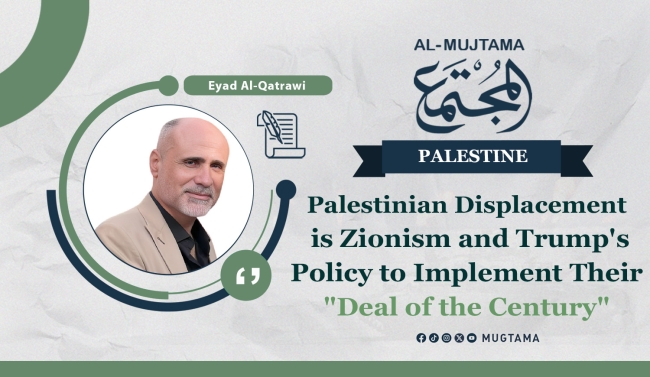The impact of Trump's recent statements regarding the displacement of Palestinians from the Gaza Strip resonated not only at the local and regional levels but also on a global scale. His remarks about relocating Palestinians to Jordan and Egypt as part of a solution to the Palestinian issue stirred up significant controversy, as they were interpreted as a call for the displacement of Palestinians or forcibly transferring them to neighboring countries instead of allowing them to live in their historic lands.
Contradiction and Unrealism
These repetitive and public statements implicitly confirm the contradiction between the electoral propaganda he promoted during the U.S. presidential elections and his prevailing policy after his inauguration as President of the United States. He built his campaign on the premise of reducing America's role abroad, yet since taking office, he has formulated an expansionist global vision that benefits his Zionist ally, at the expense of the Palestinian cause, which does not align with the positions of the international community that recognizes the right of Palestinians to establish their state on their lands. Furthermore, it conflicts with human rights and United Nations resolutions, especially concerning the right of return for Palestinian refugees.
These statements faced severe rejection from the Palestinian Authority and Arab nations, as they were viewed as an attempt to liquidate the Palestinian cause and unlawfully alter the demographic composition of the region. All reactions unanimously rejected the statements categorically and described them as unrealistic.
The statements regarding the displacement of Palestinians from Gaza did not arise in a vacuum; rather, they were a continuation of his vision during his previous term, which was part of the suspicious Deal of the Century he presented in 2020. This proposal suggested expanding Zionist territories and annexing some Palestinian areas to the occupying state.
While it is true that his proposal did not explicitly include the mass displacement of Palestinians from Gaza or other areas at that time, the proposed regional changes in the plan contained hints towards alterations in borders and land divisions. The international and Arab stance rejecting the plan and Trump's vision back then did not differ from the renewed discourse today.
A Malicious Hidden Intent
To gauge the sincerity of Trump's statements, we recall the decisions he made during his previous term in preparation for his plan and the imposition of the Deal of the Century, the most significant of which were: recognizing Jerusalem as the capital of the occupying state, moving the U.S. embassy there, reducing American financial support to the United Nations Relief and Works Agency for Palestine Refugees (UNRWA), which contributed to exacerbating the suffering of refugees, and acknowledging Zionist settlement. This provided the green light for the occupying state to increase settlement activity in the occupied Palestinian territories and proposed the Deal of the Century, which offered a unilateral vision for the Palestinian-Zionist conflict according to the Zionist perspective.
Today, in his first decisions regarding the future of the Palestinian issue, we hear his statements related to Gaza and the policy of displacing its inhabitants, as well as his intent to end the Palestinian cause and expand the territory of the entity at the expense of neighboring Arab countries, as if they are a continuation of the Deal of the Century project.
Repercussions and Effects
Trump's plan to liquidate the Palestinian cause under the Deal of the Century and the policy of displacement he endorses reflects numerous repercussions and effects on Palestinians and neighboring countries, including:
Collapse of the Peace Process
Trump's positions opposing Palestinian rights on issues related to Jerusalem, borders, and refugees, along with other stances such as that of the so-called "Deal of the Century," most recently the displacement, led to deepening disagreements between Palestinians and Zionists, significantly impacting the closure of any prospects for a peace process between both sides.
Heightening the Disparity Between the West Bank and Gaza
Trump's policies have increased the gap between the West Bank and Gaza. While the Palestinian Authority in the West Bank rejected American positions and engaged negatively with international pressures, Gaza did not recognize the international decisions directed against it. These policies exacerbated the internal Palestinian division and increased the Palestinians' inability to unite in the face of challenges.
Escalation of Military Positions
Trump's policies provided political cover for the occupying state to intensify its military operations in Gaza, leading to increased Zionist violence against Palestinians, an escalation of the situation in Gaza, and higher casualties and destruction of infrastructure in the sector.
Humanitarian Implications
Trump's stances had devastating effects on the humanitarian situation in Gaza and the West Bank, tightening the noose around Palestinians in an unprecedented manner, and intensifying the Zionist blockade on the Gaza Strip, which exacerbated living and humanitarian conditions in the sector.
Pressure on Neighboring Countries
Neighboring countries to Palestine, such as Egypt, Jordan, Lebanon, and Syria, have hosted millions of Palestinian refugees for decades, and Trump's policy increased the pressures on them due to the worsening plight of Palestinians and the dwindling international support that was reaching through UNRWA. Additionally, Trump's policy imposed further complexities on countries that opposed any forced displacement or attempts to resettle Palestinian refugees in places other than their return to Palestinian territories.
Between Pressure and Rejection
It is unlikely that Arab countries will yield to the idea of displacing Palestinians from Gaza, due to several historical, political, and humanitarian factors, including:
Palestinian Rights
The Palestinian cause represents an essential part of the identity of many Arab countries, especially those that maintain close historical relations with Palestinians, such as Jordan, Egypt, Syria, and Lebanon. These countries cannot ignore the rights of Palestinians to return to their lands, which is a fundamental aspect of the official Arab position.
Popular Pressures
In most Arab countries, the populace continues to strongly stand in solidarity with Palestinians, and any step towards displacing Palestinians or liquidating their cause could lead to angry popular reactions, increasing protests and demonstrations in the streets, which creates significant pressure on the stability of Arab governments.
The Humanitarian Crisis in Gaza
Gaza is already experiencing a severe humanitarian crisis due to the ongoing Zionist blockade and deteriorating economic conditions, and any proposals to displace or transfer Palestinians from Gaza would be seen as a coercive and unacceptable measure from all humanitarian and international perspectives. Even Arab countries attempting to improve their relations with the occupying state will find it challenging to overcome the political and humanitarian pressures demanding a commitment to a fair resolution of the Palestinian cause.
Threat to Palestinian Existence
The attempt at displacement could be viewed as a threat to the Palestinian existence in Gaza and the West Bank as a whole, and this region, which is part of the history and identity of Palestinians, will not simply accept the liquidation of the Palestinian cause through the displacement of its inhabitants.
Official Positions of Arab Countries
Even amidst the recent rapprochement between some Arab countries and the occupying state through normalization agreements, it does not appear that official alliances will go very far in accepting the forced displacement of Palestinians. Arab countries still maintain a political position that includes the two-state solution as a resolution to the Palestinian issue, and they continue to view the forced displacement of Palestinians as an unacceptable step in the broader Arab context.
International Commitments
The majority of Arab countries are subject to relevant United Nations resolutions, including those affirming the right of return for Palestinian refugees and their right to self-determination. Any agreement promoting the idea of displacing Palestinians from Gaza would contradict international law and United Nations resolutions, potentially exposing Arab countries to severe international pressures.


